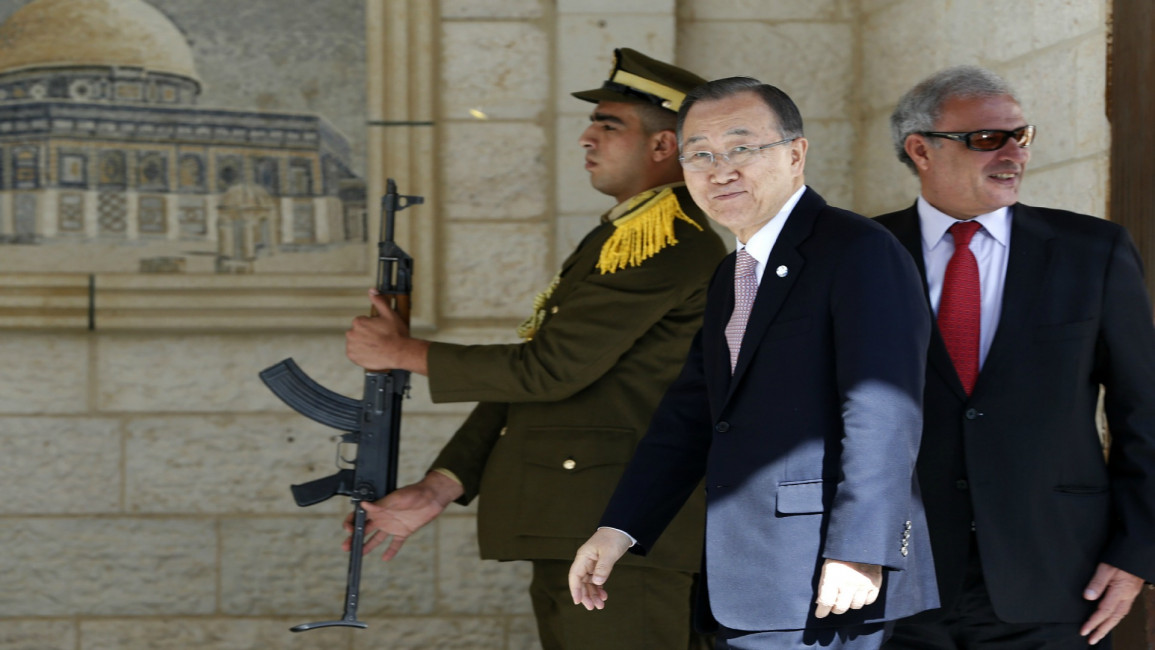
The UN's Palestine logic: Solidarity after partition
The United Nations continues to thrive upon symbolism as a sequel to its instigation of violence.
This year's "International Day of Solidarity with the Palestinian People" was no exception. Given the development of the Jerusalem intifada, the UN should be placed under harsher scrutiny, as it continues to marginalise Palestinians by insisting upon a fictitious balanced narrative.
This is a trend that has enabled the international organisation to navigate the vacuum between facts and symbolic gestures, mocking history and its outcomes in the process.
For the annual diplomatic commemoration, UN Secretary-General Ban Ki-moon issued a statement dominated by a brief recapitulation of the past weeks, including an affirmation of "our commitment to bring about the just peace that the peoples of Israel and Palestine deserve".
On November 29, 1947, the UN had ulterior motives which took precedence. The Partition Plan played right into the hands of the Zionist movement and its colonising ambitions, providing a foundation from which to launch a permanent course of violence that ultimately led to the Nakba and the establishment of the Israeli state - to the detriment of Palestinian self-determination.
By concocting illusory remembrance activities, the UN is also seeking to divert attention from the historic narrative of November 29. The affirmation of the intent to colonise has been eclipsed by mundane, vaguely purported solidarity.
| By concocting illusory remembrance activities, the UN is also seeking to divert attention from the historic narrative |
Among countries opposing the Partition Plan, Cuba maintained a stance that remained remarkably consistent throughout the decades. Former Cuban Ambassador to the UN Dr Ernesto Dihigo declared: "We have solemnly proclaimed the principle of free determination of the peoples, but with great concern we see that when the time has come to enforce it, we forget it."
The Cuban opposition to the Partition Plan resulted in influencing a form of internationalism that ranged from supporting Palestinian resistance movements to diplomatic endeavours. This stance has more recently been emulated by Venezuela, with its provision of education and health programmes to enable Palestinians to establish foundations for an independent society, despite colonial constraints.
The UN, on the other hand, has promoted a multi-faceted agenda that can be discerned through an overview of resolutions - and their lack of implementation - as well as the prevailing narrative that repudiates what is enshrined in international law.
In 1960, the UN General Assembly adopted Resolution 1514 which stipulated the granting of independence to colonial countries and peoples. The declaration specifically states that "the subjection of peoples to alien subjugation, domination and exploitation constitutes a denial of fundamental human rights".
Resolution 2621, adopted in October 1970, further declares that "continuation of colonialism in all its forms and manifestations [is] a crime which constitutes a violation of the Charter of the United Nations, the Declaration of the granting of Independence to Colonial countries and Peoples, and the principles of international law".
In 1977, the UN General Assembly also reaffirmed "the legitimacy of the struggle of peoples for independence, territorial integrity, national unity and liberation from colonial and foreign domination and alien subjugation by all available means, including armed struggle".
Away from the obvious complicity that has generated ineffective resolutions and the invalidation of Palestinian narratives and memory at an international level, the UN has perpetually embarked upon symbolic gestures that are hailed as a step forward but clearly do not exceed the boundaries stipulated by diplomatic protocol.
The latest charade was the inclusion of the Palestinian flag at the UN, while consistently rejecting the right to armed resistance by upholding Israel's security narrative.
Not content with promoting two-state rhetoric and subjugation for Palestinians, the UN also actively participates in Israel's security propaganda by forming allegiances with companies that have vested interests in Israel, such as G4S.
According to the UN Supplier Code of Conduct, suppliers or goods and services to the UN are expected to "respect human rights, social justice and human dignity".
The linguistic use of "expectations" throughout the document is an example of UN impunity - a perpetual clause that allows the UN to violate international law by placing the burden of compliance upon companies offering services to the organisation - while exempting the organisation itself from such scrutiny.
One example would be the UN's expectation that suppliers "respect the protection of internationally proclaimed human rights and to ensure that they are not complicit in human rights abuses".
G4S provides services to the Israeli Prison Service as well as surveillance technology to be used in checkpoints, rendering the company complicit in severe human rights violations against the Palestinian population.
| For the UN, knowledge exists only within the context of manipulation or intentional ridicule |
Palestinian NGO Addameer is petitioning the UN to cease its collaboration with G4S, pointing out its work with Israel, particularly within the context of the Jerusalem intifada - which has resulted in a mass incarceration of Palestinian civilians, including children, being held in prisons where G4S benefits from contracts.
For the UN, knowledge exists only within the context of manipulation or intentional ridicule. According to the organisation, the annual commemoration should serve as a remembrance of unresolved issues for Palestine while affirming a commitment towards a solution.
A more accurate definition would include a clause that stipulates the difference between rhetoric and action. From partition to solidarity, this annual travesty of memory should be rendered obsolete.
Ramona Wadi is an independent researcher, freelance journalist, book reviewer and blogger specialising in the struggle for memory in Chile and Palestine, colonial violence and the manipulation of international law.
Opinions expressed in this article remain those of the author and do not necessarily represent those of al-Araby al-Jadeed, its editorial board or staff.





 Follow the Middle East's top stories in English at The New Arab on Google News
Follow the Middle East's top stories in English at The New Arab on Google News


